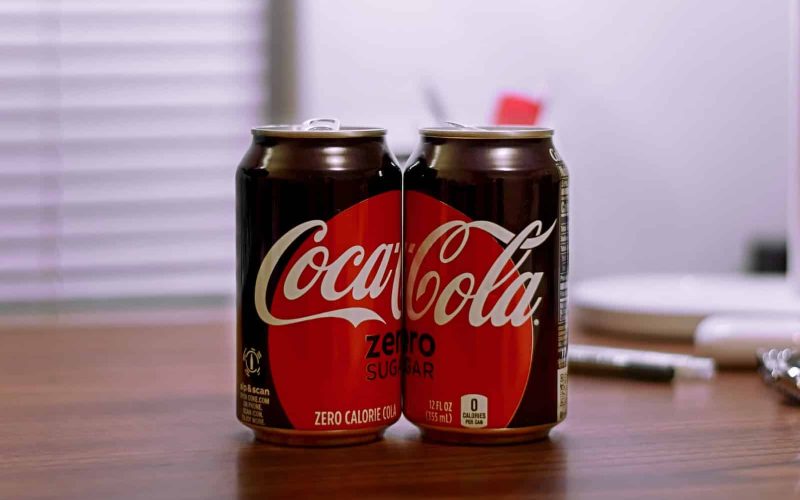Welcome to the world of calorie counting! It’s a practical tool that can help you manage your dietary habits and make informed decisions about what and how much you eat and drink.
Whether you’re trying to lose weight, gain weight, or maintain your current weight, understanding calories is key.
This knowledge is especially important when you’re considering drinks like Coke Zero – after all, you’re probably wondering just how many calories in a can of Coke Zero.
Understanding Calories
First things first: what exactly is a calorie? A calorie is a unit of energy that your body uses for everything it does, from moving to breathing to thinking.
They’re the fuel your body needs to function, and you get them from the foods and drinks you consume.
There are calories in nearly everything you eat or drink, from the sugar in your morning coffee to the cheese on your pizza slice.
The exact number of calories depends on the portion size and the nutritional composition of the food or drink.
For instance, a can of regular Coke has about 150 calories, but what about its zero calorie counterpart? We’ll get to how many calories in a can of Coke Zero later in this article.
The Importance of Calorie Counting
Calorie counting can be a helpful tool in managing your dietary habits.
By knowing how many calories are in the foods and drinks you consume, you can ensure you’re getting enough energy for your body’s needs without overdoing it.
Keeping an eye on your calorie intake can help you maintain a healthy weight, lose weight, or even gain weight if you’re underweight.
For instance, if you’re trying to lose weight, you need to consume fewer calories than you burn.
On the other hand, if you’re trying to gain weight, you need to consume more calories than you burn.
Calorie counting is also important when considering beverages, as they can often be a hidden source of calories.
Regular sodas, for instance, are often high in calories due to their sugar content.
Zero-calorie drinks like Coke Zero are marketed as healthier alternatives.
Still, it’s important to understand what “zero calories” really means—and that’s just what we’ll explore as we dive into how many calories in a can of Coke Zero.
For more information on calorie counting, check out our article on what is calorie counting.
And suppose you’re curious about the calorie content of other foods and drinks.
In that case, we have a vast library of articles for you to explore, from how many calories in rice to how many calories in eggs benedict.
The Concept of Zero-Calorie Drinks
On your journey to understand how many calories in a can of Coke Zero, you’ve likely come across the term “zero-calorie” drinks.
But what does that really mean? How do companies achieve this “zero-calorie” status? Let’s dive in.
What Does “Zero Calorie” Mean?
In the world of nutrition, “zero calories” refers to a food or drink that contains such a minuscule amount of calories that it’s not likely to impact your daily caloric intake significantly.
Legally, for a product to be labeled as “zero calories,” it must provide fewer than 5 calories per serving. In terms of drinks, that’s typically per 8 fl oz serving.
So, even though these drinks might not be absolutely calorie-free, they’re close enough to zero to be considered negligible in your daily calorie count.
How Companies Achieve “Zero Calories”
To create these almost calorie-free drinks, companies use a number of strategies.
The most common method is to replace sugar, which is high in calories, with low-calorie or zero-calorie sweeteners.
These sweeteners, such as aspartame or sucralose, provide the sweet taste you’re used to without the added calories.
Artificial sweeteners can be hundreds of times sweeter than sugar, meaning only a tiny amount is needed to achieve the desired sweetness.
This is how companies can keep the calorie count low, even in sweet drinks like Coke Zero.
However, it’s worth noting that while zero-calorie drinks don’t contribute much to your daily calorie intake, they should not replace nutrient-dense beverages like water or unsweetened tea.
There’s more to nutrition than just calories, after all.
To delve deeper into the world of calorie counting, check out our article on what is calorie counting for more information.
And remember, understanding the caloric content of food and drinks is one step in creating a balanced and healthful diet.
Unveiling the Calorie Count in Coke Zero
You’ve probably wondered about the truth behind the claim of ‘zero calories’ in Coke Zero.
Let’s dive into it and separate the facts from advertising.
Reading the Nutrition Facts
If you look at the back of a can of Coke Zero, you’ll find the nutritional facts panel.
This is where companies list the content of nutrients per serving.
For Coke Zero, the nutrition facts panel would look something like this:
| Nutrient | Amount per serving |
|---|---|
| Total Fat | 0g |
| Sodium | 40mg |
| Total Carbohydrates | 0g |
| Sugars | 0g |
| Protein | 0g |
| Energy | 0 Calories |
As you can see, Coke Zero is indeed marked as having zero calories. But what does that mean exactly?
Understanding What “Zero Calories” Means in Coke Zero
The term ‘zero calories’ doesn’t mean there are absolutely no calories in the drink.
According to FDA guidelines, a product can be labeled as ‘zero calories’ if it contains less than 5 calories per serving.
So, technically, Coke Zero may contain a few calories, but it’s less than 5 calories per can, which allows it to be labeled as ‘zero’.
Coke Zero achieves this low-calorie count by using artificial sweeteners instead of sugar.
Artificial sweeteners, like aspartame and acesulfame potassium used in Coke Zero, are several hundred times sweeter than sugar, so only a tiny amount is needed.
This results in a sweet taste without the calories of sugar.
Remember, while zero or low-calorie drinks like Coke Zero can be part of a calorie-controlled diet, they shouldn’t replace healthier drinks like water.
Zero-calorie drinks can still have effects on your health, especially if consumed in large amounts.
So next time you wonder about how many calories in a can of coke zero, remember that while it’s not truly zero, it’s still very low. But like all things, moderation is key!
Impact of Coke Zero on Health and Diet
As a calorie counter, you’re probably wondering about the effects of zero-calorie drinks like Coke Zero on your health and diet.
Let’s delve into the short-term and long-term impacts of these drinks.
Short-Term Effects of Zero-Calorie Drinks
In the short term, zero-calorie drinks like Coke Zero can be a useful tool for weight management.
They allow you to enjoy the sweet taste of soda without consuming any calories.
However, while it’s true that these drinks contain zero calories, that doesn’t mean they don’t have any impact on your health or eating habits.
One short-term effect of consuming zero-calorie drinks is that they can lead to increased cravings for sweet foods.
Because these drinks are sweetened with artificial sweeteners that are many times sweeter than sugar, they can skew your taste buds, making naturally sweet foods, such as fruits, seem less sweet by comparison.
They can also trigger a response in your body that expects sugar, causing it to release insulin, which can lead to increased hunger.
Long-Term Effects of Zero-Calorie Drinks
Over the long term, consuming zero-calorie drinks regularly can have more serious health implications.
Some studies suggest that these drinks can lead to weight gain and an increased risk of metabolic syndrome, a group of conditions that increase your risk of heart disease, stroke, and type 2 diabetes.
Another potential long-term effect is an increased risk of dental decay.
Although zero-calorie drinks don’t contain sugar, they are usually acidic, which can erode tooth enamel.
Furthermore, while zero-calorie drinks might not provide calories, they also don’t provide any nutritional value.
By choosing these drinks over more nutritious beverages, such as water, milk, or 100% fruit juice, you could be missing out on essential nutrients.
Remember, while zero-calorie drinks like Coke Zero can be included in your diet, they should not replace nutrient-dense, low-calorie beverages.
Always consider the full nutritional profile of a drink, not just its calorie content.
For more detailed insights about calorie counting, visit our comprehensive guide on what is calorie counting.
Alternatives to Zero-Calorie Drinks
While zero-calorie drinks like Coke Zero can be a tempting option for those watching their caloric intake, there are also a range of other beverage choices that can provide low calories and additional health benefits.
Natural, Low-Calorie Drink Options
If you’re interested in exploring natural, low-calorie alternatives, you’ll be pleased to know there are plenty to choose from.
- Water infused with fruits, herbs, or cucumbers offers a refreshing and hydrating option with minimal calories. It’s easy to make at home, and you can experiment with different flavor combinations to keep things interesting.
- Green and herbal teas are also excellent low-calorie options, particularly if you avoid adding sugar or honey. Both are rich in antioxidants and have numerous health benefits.
- Black coffee is another great choice if you’re seeking a calorie-free pick-me-up. You can check out our article on how many calories in black coffee for more information.
Importance of Hydration and Water Intake
It’s essential to remember the importance of hydration in any diet or health plan.
While it’s perfectly okay to enjoy low-calorie beverages as part of your diet, nothing replaces the benefits of plain water.
Water is crucial for almost every system in your body. It aids in digestion, helps transport nutrients, regulates body temperature, and more.
Staying well-hydrated can also support weight management by helping you feel fuller and reducing unnecessary snacking.
So, while it’s fine to enjoy a can of Coke Zero or any other zero-calorie drink occasionally, remember that these are not substitutes for the water your body needs.
Aim to drink at least eight 8-ounce glasses of water each day, and increase this amount if you’re active or if the weather is hot.
In conclusion, while understanding the calorie content of drinks like Coke Zero can be useful, it’s equally important to explore other beverage options.
By trying out different low-calorie drinks and prioritizing hydration, you can enjoy a varied, balanced diet while still keeping an eye on your calorie intake.
For more information on calorie counting and other healthy eating tips, feel free to browse through our calorie counting articles.







